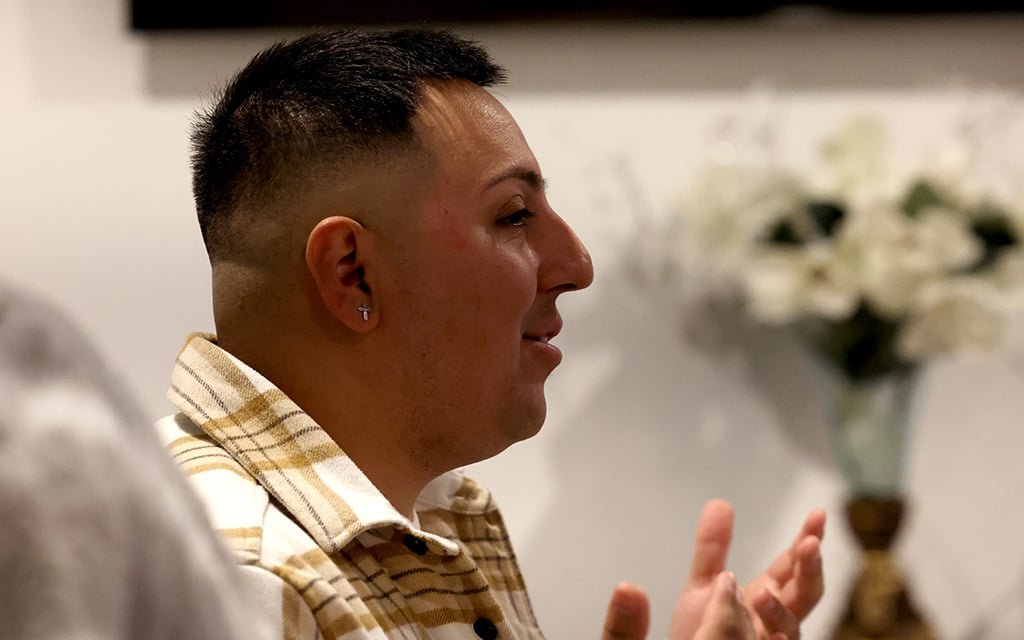Ronnie Morales, a former fentanyl user, said in his home on January 31 that fentanyl “became my coffee.” (Photo by: Kevinjonah Paguio/Cronkite News)
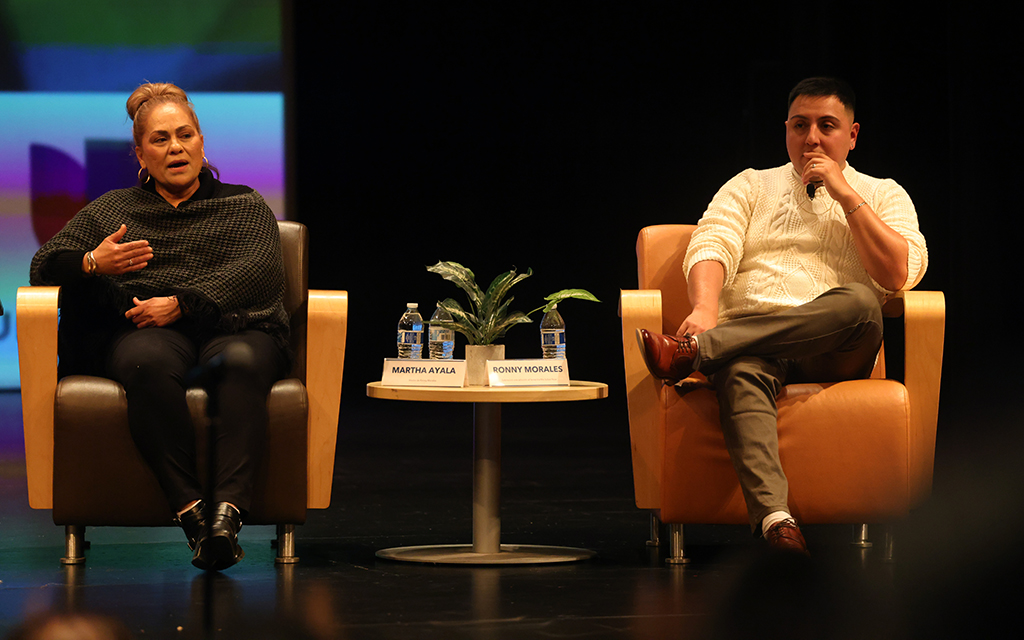
Ronnie Morales' mother, Martha Ayala, will speak at the Maricopa County Community Forum on February 6th. Morales said his fentanyl use “destroyed” her mother. (Photo by: Kevinjonah Paguio/Cronkite News)
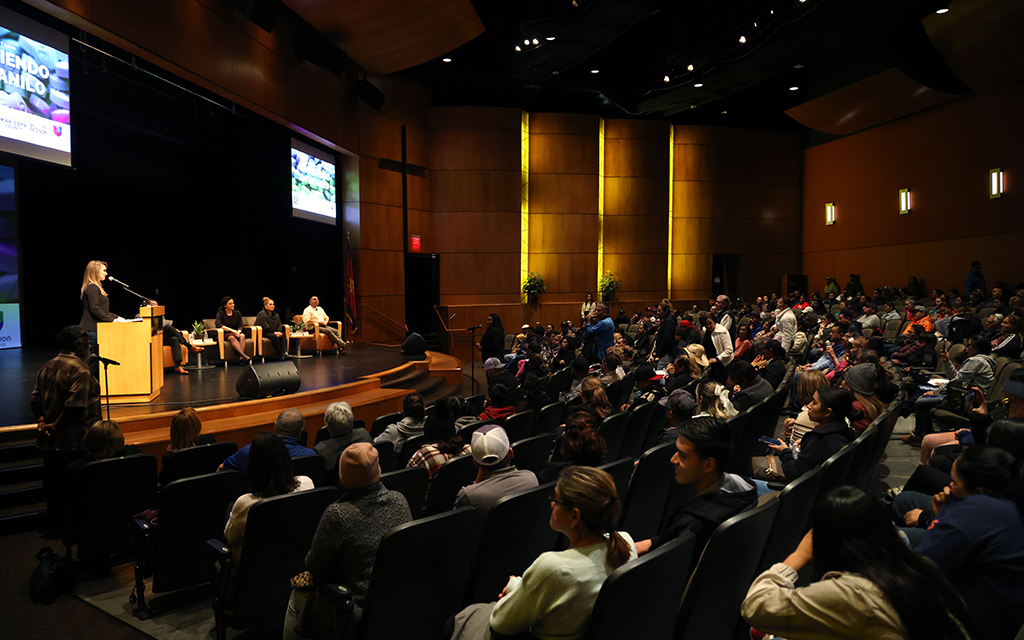
A packed auditorium at the Combatiendo el Fentanilo (Fighting Fentanyl) community forum, held entirely in Spanish by the Maricopa County Attorney's Office and the Equality Health Foundation, on Feb. 6. ((Photo by: Kevinjonah Paguio/Cronkite News)
PHOENIX – Ronnie Morales didn't get a journalism degree from Arizona State University. After attending school for four years, the Cronkite Noticias student was only a week away from graduation when he completed a one-credit internship.
Morales said it wasn't a lack of enthusiasm or field experience that kept him from graduating, but rather his fentanyl addiction.
“At[Cronkite Noticias']first newscast, he wasn't addicted yet, but he was definitely addicted,” Morales said. “And towards the end, I was coming down and I think I saw it.”
Fentanyl is a synthetic opioid drug that produces euphoria, relaxation, and pain relief. According to the U.S. Drug Enforcement Administration, it is about 100 times more potent as a painkiller than morphine and 50 times more potent than heroin.
Fentanyl was involved in nearly 75% of confirmed non-fatal opioid overdoses in Arizona in 2023, according to the Arizona Department of Health Services.
On February 6, Morales and his mother, Martha Ayala, told their story at a forum on fentanyl addiction held in Spanish and hosted by the Maricopa County Attorney's Office and the Equality Health Foundation.
The Maricopa County Attorney's Office said more than 250 people attended the forum, the largest ever for an MCAO forum, and 240 Narcan kits were distributed.
Like many people who become addicted to opioids, Morales' problem started with a prescription. In 2012, as a 19-year-old college student, Morales was involved in a serious car accident and was prescribed Percocet, his brand of opioid medication, for three months.
“Within three months, my body became physically and definitely mentally dependent on those opiates,” Morales said.
Doctors stopped prescribing painkillers, and Morales suffered severe withdrawal symptoms. He purchased Percocet from someone with a valid prescription to end his symptoms, unaware of the long-term consequences of this action.
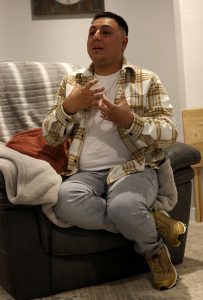
Ronnie Morales confessed on January 31st to his past use of fentanyl. “I've tried to quit almost every year,” he says. (Photo by: Kevinjonah Paguio/Cronkite News)
“All the physical pain and all the anxiety I was experiencing from withdrawal disappeared within 30 minutes. It was an incredible feeling and I felt like I had found the secret to life.” Morales said of the temporary relief his continued drug use brought him.
As Morales' addiction worsened, he bought more drugs, including Vicodin, Adderall and cocaine. Although the effects began to wear off, he continued to use it regularly to maintain his energetic and lively personality.
“Maybe within a year or so, I started not necessarily feeling high,” Morales said. “That became my coffee. I needed to get high in order to stay awake, alert, and consistent.”
In addition to these drugs, Morales primarily used fentanyl. For more than seven years, Morales justified his daily drug use and denied that he was addicted. When his license was revoked and he was fired from his job at a radio station for driving a company car, he knew he couldn't continue living under the influence of alcohol.
“I tried to quit countless times, almost every year. I went to several rehabs, I went to several detoxes. At the end of the day, it didn't work,” Morales said.
Morales lived with his mother throughout his addiction, but her mother was unaware of her son's drug use. Morales said she had always been a good girl, but she never expected Ayala to use drugs.
“She knew I was going through something, but she couldn't fathom the idea of what was going on,” Morales said. “I've always been dramatic, but she wouldn't think I was doing drugs.”
While Morales was detoxing, his mother questioned him about his strange behavior. He told her he was having fentanyl withdrawal symptoms. She didn't know anything about drugs, but she wanted to help.
“It was incredibly shocking to her because she comes from a small town in Mexico,” Morales said. “She doesn't know where I'm going and she doesn't know what I'm going to get.”
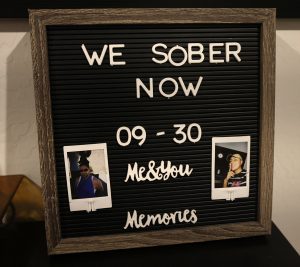
A plaque commemorating the day Ronnie Morales started his sobriety, now in his fourth year. (Photo by: Kevinjonah Paguio/Cronkite News)
From that moment on, Morales said, Ayala supported him and sought other ways to end his addiction. Together, they faced cultural barriers that prevented many people in the Hispanic community from addressing drug use.
“The culture is very stubborn when it comes to accepting things like mental health and addiction,” Morales said. “We know that there are people who are struggling and can't come forward because of cultural or language barriers or things like that, or they don't even have the documents to come here. has no choice but to remain in its addictive state.”
Morales said the key to recovery is taking everything one day at a time. Eventually, he started attending support groups, where he noticed that he was often one of the few Hispanics there.
“I don't think it's because I'm one of the few Hispanics who struggles with addiction or alcoholism. I just think it has a lot to do with culture, language barriers, documentation, etc.,” Morales said. said.
In 2023, Hispanics accounted for 30% of Arizona's 1,865 opioid overdose deaths, according to the Arizona Department of Health Services.
Linda Garcia is the deputy chief of staff for the Maricopa County Attorney's Office and was one of the other panelists at the Feb. 6 forum. The forum aims to break down the language barrier that prevents many Hispanic people from seeking help, she said.
Related article
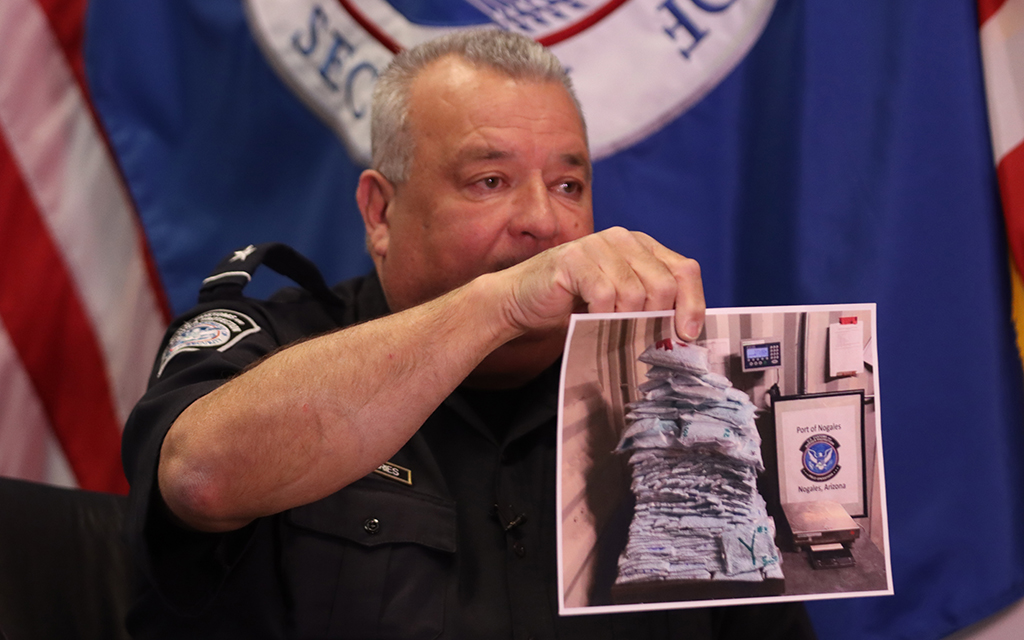
“We have had a community presence in English community forums, but it is definitely better to do it in Spanish for better understanding,” Garcia said. “People feel much more comfortable asking questions in their native language.”
Morales has now been sober for four years and is the host of the podcast Wesobernow. After Ms. Morales gained followers on her TikTok with content about her own journey, she started a podcast to inspire others to reach her sobriety goals. Now, he said, his podcast audience helps him stay sober.
“In a good way, just sharing my story, at the end of the day, that's what motivated me to stay sober,” Morales said. “This is the longest I've ever been sober.”
Morales said the first step to recovery was recognizing the problem and the second step was seeking help. He credits much of his sobriety to his support system, which includes Nathan Truitt, his husband of just over a year. He said his mother was a key person throughout, and she took the initiative to learn and struggle with him.
“She was still fighting me,” Morales said. “That's how I know what true love is. Just fighting for someone or something without necessarily knowing why. It's because you want what's best for them.” ”

